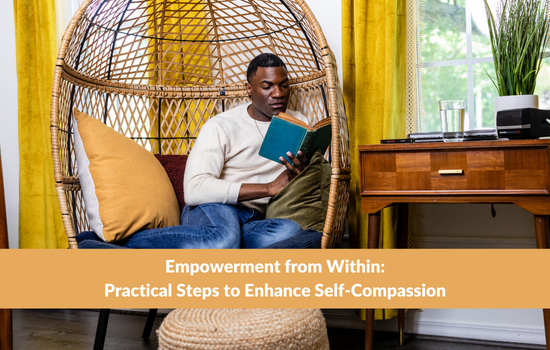When it comes to compassion, many lack the emotional intelligence skills to shift their focus on self-care and embrace self-compassion to boost mental health.
A Guide to Boosting Self-Compassion for Optimal Growth
Unsurprisingly, each of us is best suited to manage our self-care.
After all, we know what our mind, body, and soul need to fuel the pursuit of excellence and mindfulness. But for many, self-care and self-compassion are not a focus. Therefore, these critical elements fall to the bottom of your daily "to-do" list—our time occupies many responsibilities, including caregiving for others and career. This attitude leads one to believe there is simply no time left to focus on themselves.
I encourage you to spend more time on your self-care and increase your emotional intelligence. Here is a blog that will help you begin: Emotional Intelligence: What it Means & Why it Matters.
There Is A Correlation Between Self-Compassion And Mental Health
Exercising self-compassion is making a conscious decision to focus on your self-care. Self-compassion is about extending compassion to oneself in instances of perceived inadequacy, failure, or general suffering. We all make mistakes, so we need to learn to be kinder and gentler with ourselves. Our performance is not enhanced when we are self-critical.
Self-compassion is crucial to our overall well-being and mental health. Self-compassion is a powerful ally for mental health and general well-being. It provides a nurturing foundation that empowers individuals to face life's challenges with resilience, kindness, and a positive mindset.

Self-compassion is crucial to overall well-being and mental health for several reasons:
- Reducing Stress and Anxiety
- Enhancing Emotional Resilience
- Improving Emotional Regulation
- Promoting Healthy Relationships
- Boosting Self-Esteem
- Encouraging Self-Care
- Breaking the Cycle of Perfectionism
- Alleviating Depression Symptoms
- Enhancing Mindfulness
- Supporting Long-Term Happiness
Taking Care Of Yourself First Allows You to Assist Others In Need Better
Self-care is a remarkable gift that keeps on giving. Before every flight, airline flight attendants remind us to focus on self-care and put on our oxygen masks first should they suddenly drop from overhead. Because if you take care of yourself first, you'll be better able to help others in need. And yet, we often struggle to focus and provide appropriate self-care in this and many other instances. It seems we are hard-wired to focus on the well-being of others instead of ourselves.
Five Ways To Improve Self-Compassion
Here are five of Dr. Neff’s strategies for improving self-compassion published by Psych Central:
- Consider how you’d treat someone else. The simplest thing you can do is to imagine what you’d do if someone you cared about came to you after failing or getting rejected.
- Watch your language. You may be so used to criticizing yourself that you don’t even realize that you’re doing it.
- Comfort yourself with a physical gesture. Kind physical gestures have an immediate effect on our bodies, activating the soothing parasympathetic system.
- Memorize a set of compassionate phrases. Whenever you find yourself saying, “I’m horrible,” it helps to have a few phrases at the ready. Pick statements that really resonate with you.
- Practice guided meditation. Meditation helps to retrain the brain. This way, self-compassionate gestures
and self-soothing become more natural.
Go ahead and try a few of these strategies. Spend some time placing your self-care first. If you find you're judging and criticizing yourself, stop and rephrase your words with positive self-talk. When you focus on self-care, you will find it much easier to be self-compassionate. After all, who said you're supposed to be perfect?
Strengthening your emotional intelligence will improve your self-awareness, support your self-care, increase your self-compassion, and support your mental health. To learn more about emotional intelligence, read my book, The Power of Emotion. Check out many more motivational blogs here.
This article was originally published on April 21, 2018, and has been updated (January 2024).
More Motivational Reads Here »
How Emotionally Intelligent Are You?
Sign up for Linda’s monthly tips to build your Emotional Intelligence and reduce Emotional Hijacking!

















